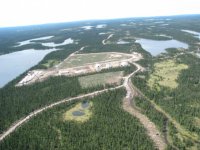Canada's chief nuclear regulator has publicly criticised calls for uranium mining moratoria that fail to take account of scientific research.
 |
| Matoush, Quebec (Image: Strateco) |
In an open letter published on 22 November, Canadian Nuclear Safety Commission (CNSC) president Michael Binder voiced his dismay that "recent statements and discussions on the safety of uranium mining have been based neither on fact nor science." Pointing to the exemplary track record of Canada's uranium mining sector, Binder noted that it is also the only type of mining in the country to have a dedicated federal regulator overseeing all aspects of operation on an ongoing basis, and is in fact "the most regulated, monitored and understood type of mining in Canada."
"Activists, medical practitioners and politicians who have demanded moratoriums may have various reasons for doing so, but their claims that the public and environment are at risk are fundamentally wrong. The provincial governments that have decided to ban uranium exploration have done so ignoring years of evidence-based scientific research on this industry," Binder said in his letter.
Binder emphasised the CNSC's role in ensuring that any uranium development meets stringent regulatory criteria. "The CNSC will never compromise safety and would never issue a licence for a mining or milling operation unless the proposed activities were safe," he said.
Binder's letter was written following a 17 October decision by the CNSC to issue a licence to Strateco Resources Inc authorising the excavation of an exploration ramp and construction of surface facilities at the Matoush project in the Otish Basin of northern Quebec. The CNSC licence, which will expire on 31 October 2017, is limited to advanced exploration activities only. Any possible future mining activities would be subject to a new environmental assessment and licensing hearings.
Groups including the region's indigenous population, part of the Cree Nation, oppose the development and are pushing for a moratorium on uranium exploration and mining in Quebec. The provincial government, led by Pauline Marois, recently renewed a commitment with the Cree nation to implement a northern land management agreement. According to the Montreal Gazette, Marois has strongly hinted that the provincial government would insist on a "wholesale environmental assessment review process" before any uranium mining could take place on Cree lands.
Canada is the world's second largest producer of uranium, with current production mainly coming from the McArthur River mine in northern Saskatchewan's Athabasca Basin. Numerous companies are active in exploring for uranium in , and although exploration has tended to centre on northern Saskatchewan, new prospects have been identified in Labrador and Nova Scotia, Quebec, Nunavut and the Elliott Lake area in Ontario. The Nunatsiavut Assembly, a regional Inuit government within Labrador and Newfoundland voted in 2011 to lift a moratorium on the development of uranium prospects on Labrador Inuit lands.
Researched and written
by World Nuclear News




_730_93825.jpg)

_83147.jpg)
_87299.jpg)






